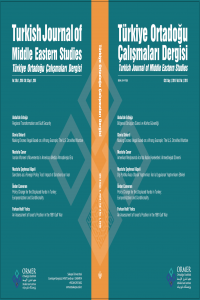Abstract
International and regional
organizations can act as persuasive actors with regard to minority rights in a
given country by raising awareness, putting the issue on agenda, and endorsing a
new platform in a country which may lead to a policy change. Despite the
general observation that Turkey's Europeanization process
has had limited impact on the minority
issues in Turkey, there are numerous examples
that the European Union (EU) has played a constructive role
in improving of rights
and fundamental freedoms for the Kurdish populace living in Turkey. The Law on Compensation for
Damage Arising from Terror passed in 2004 is a case worth addressing in order
to ascertain both the symbolic and discursive policy change. The aim of this article is to explain how the EU used
democratic tools to promote change in Turkey’s political structure for the
displaced Kurds. The Europeanization of Turkey, based on specific
conditionality, is taken as primarily responsible for granted for the shift and
the policy change. In this policy-oriented
case study, hypotheses from Rationalist and Constructivist Approaches in
Europeanization literature are investigated to explain the causes of the policy
shift from repudiate to compensation.
References
- Demir, İpek. “Humbling Turkishness: Undoing the Strategies of Exclusion and Inclusion of Turkish Modernity.” Journal of Historical Sociology 27, no. 3 (2014): 381-401.
- Erkan, Rüstem and Mazhar Bağlı. “Göç ve Yoksulluk Alanlarında Kentle Bütünleşme Eğilimi: Diyarbakır Örneği.” Hacettepe Üniversitesi Edebiyat Fakültesi Dergisi 22, no. 1 (2005): 105-124.
- Gökalp, Deniz. “A Gendered Analysis of Violence, Justice and Citizenship: Kurdish Women Facing War and Displacement in Turkey." Women's Studies International Forum 33, no. 6 (2010): 561-569.
- Göksu, Turgut and Veysel K. Bilgiç. "Kentleşme ve Göçün Teröre Etkisi." In Terörün Soyal Psikolojisi, edited by Murat Sever et al. 167-187. Ankara: UTSAM, 2010.
- Hassanpour, Amir and Shahrzad Mojab. "Kurdish Diaspora." In Encyclopaedia of Diasporas: Immigrant and Refugee Cultures around the World, edited by Melvin Ember et al. 214-224. New York: Springer, 2005.
- Jongerden, Joost. “Settlement Wars. An Historical Analysis of Displacement and Return in the Kurdistan Region in Turkey at the Turn of the 21st century.” PhD Dissertation, Wageningen University, 2006.
- Karakaya Polat, Rabia. ‘The 2007 Parliamentary Elections in Turkey: Between Securitisation and Desecuritisation.” Parliamentary Affairs 62, no. 1 (2009): 129-147.
Abstract
Uluslararası ve
bölgesel örgütler, gündem yapmak ve politika değişikliği ile sonuçlanabilen
yeni bir düzlemi desteklemek yoluyla bir ülkede azınlık hakları konusunda ikna
edici bir aktör olarak hareket edebilirler. Türkiye'nin Avrupalılaşma sürecinin
ülkede azınlık hakları konusunda sınırlı bir etkiye sahip olduğu genel
gözlemine rağmen, Türkiye’de yaşayan Kürt nüfusun hak ve özgürlüklerinin
geliştirilmesinde Avrupa Birliği'nin (AB) yapıcı bir rol oynadığı örnekler
mevcuttur. 5233 Sayılı Terör ve Terörle Mücadeleden Doğan Zararların
Karşılanması Hakkında Kanun hem söylemdeki hem de politikadaki sembolik
değişimi ortaya koyması bakımından incelemeye değer bir örnektir.Bu makalede,
demokrasi destekleyicisi olarak AB'nin yerinden edilmiş Kürtler hususunda Türkiye'de
değişimi nasıl sağladığının açıklanması amaçlanmaktadır. Koşulluluk ilkesine
dayalı Türkiye'nin Avrupalılaşması, değişimin ve politika değişikliğinin temeli
olarak alınmıştır. Politika odaklı bu vaka çalışmasında Avrupalılaşma
literatüründeki Rasyonalist ve Konstruktivist yaklaşımlarda yer alan
hipotezler, inkardan tazminata, politikadaki değişimin nedenlerini açıklamak
için kullanılmıştır.
References
- Demir, İpek. “Humbling Turkishness: Undoing the Strategies of Exclusion and Inclusion of Turkish Modernity.” Journal of Historical Sociology 27, no. 3 (2014): 381-401.
- Erkan, Rüstem and Mazhar Bağlı. “Göç ve Yoksulluk Alanlarında Kentle Bütünleşme Eğilimi: Diyarbakır Örneği.” Hacettepe Üniversitesi Edebiyat Fakültesi Dergisi 22, no. 1 (2005): 105-124.
- Gökalp, Deniz. “A Gendered Analysis of Violence, Justice and Citizenship: Kurdish Women Facing War and Displacement in Turkey." Women's Studies International Forum 33, no. 6 (2010): 561-569.
- Göksu, Turgut and Veysel K. Bilgiç. "Kentleşme ve Göçün Teröre Etkisi." In Terörün Soyal Psikolojisi, edited by Murat Sever et al. 167-187. Ankara: UTSAM, 2010.
- Hassanpour, Amir and Shahrzad Mojab. "Kurdish Diaspora." In Encyclopaedia of Diasporas: Immigrant and Refugee Cultures around the World, edited by Melvin Ember et al. 214-224. New York: Springer, 2005.
- Jongerden, Joost. “Settlement Wars. An Historical Analysis of Displacement and Return in the Kurdistan Region in Turkey at the Turn of the 21st century.” PhD Dissertation, Wageningen University, 2006.
- Karakaya Polat, Rabia. ‘The 2007 Parliamentary Elections in Turkey: Between Securitisation and Desecuritisation.” Parliamentary Affairs 62, no. 1 (2009): 129-147.
Details
| Journal Section | Makaleler |
|---|---|
| Authors | |
| Publication Date | October 15, 2016 |
| Acceptance Date | September 15, 2016 |
| Published in Issue | Year 2016 Volume: 3 Issue: 1 |
The published articles in TJMES are licensed under a
Creative Commons Attribution-NonCommercial 4.0 International License



